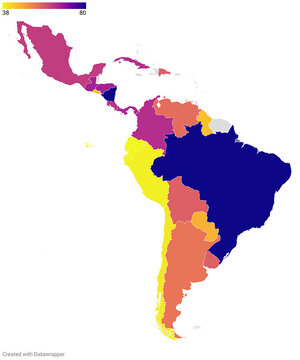From James Bosworth...AKA Boz
A hardline mano dura populist with a congressional majority would be a reason to worry elsewhere, but probably not in Costa Rica.
Laura Fernandez, the candidate of the ruling party and President Rodrigo Chaves, won the Costa Rican presidential election in the first round with 48% of the vote. In the final week, some of the anti-incumbent vote coalesced around Alvaro Ramos, who won about 33% of the vote, but it was not enough given the 40% threshold to win.
Good Graphics Here:
Resultados elecciones 2026 Costa Rica: presidencia y diputados
A president with the congressional majority that Chaves never had. The Pueblo Soberano Party (PPSO) will have 31 of the 57 seats in the legislature, giving Fernandez a majority. That will make it easier to pass legislation and avoid routine opposition from the Congress. The PPSO did not win a super-majority, meaning the president will not be able to call for any constituent assembly or change the constitution, something her party had promised in its platform.
La Nacion has a good breakdown of what the president-elect can and cannot accomplish with her 31 seats.
The Chaves controversies will continue. Fernandez promised to include the current president in her government to maintain his immunity from prosecution. She is likely to deliver that to her former boss, at least at first. The new legislature will be more friendly, meaning that Chaves’s presence won’t hinder her early agenda. Yet, his personality and lingering scandals will hang over her administration and leave questions of whether she is acting as a puppet.
Her own presidency? There are plenty of examples in Latin America of presidents who dedazo’d a successor, only to have that person turn on them. That should be Chaves’s big fear. One reason Fernandez will struggle to become independent from her patron is that at least some of the members of the congressional majority are loyal to Chaves rather than to the new president. They are true Chavistas (yes, it’s weird to use that word in the Costa Rican context).
Fernandez, the populist. In some ways, the new dynamic in Costa Rica resembles the Sheinbaum-AMLO relationship, where the president both needs her predecessor and is harmed by the controversies that follow him. However, the big difference between Sheinbaum and Fernandez is that Mexico’s president has a credible technocrat-focused administration, despite her embrace of some populist characteristics, while the new Costa Rican president went full populist during the campaign.
Mano Dura, but does it work? Fernandez ran on a hardline approach to crime. Salvadoran President Nayib Bukele visited during the campaign and appeared to back her promises. However, as
I wrote last week for subscribers, Costa Rica has also seen a sharp rise in crime under the current administration’s hardline approach. The Salvadoran approach, both in fact and myth, struggles when applied to other contexts. So while hardline rhetoric is popular during campaigns, I expect the security agenda to struggle under the next administration (another difference between Fernandez and Sheinbaum), and that security struggle will likely damage the new president’s popularity over the early part of her term.
Watch the relationship with China. Unlike the recently inaugurated Nasry Asfura in Honduras, Fernandez made no promises to quit Beijing and recognize Taipei during the campaign. Still, Chaves’s relationship with Beijing was not calm during his term in office and there will be pressure from the Trump administration to reduce ties with China over the coming four years. Beijing did not honor its investment commitments made after Costa Rica reversed recognition in 2007, and there is lingering controversy over how Beijing convinced Costa Rican politicians to support that reversal.
The opposition lacks a vision. Fernandez’s opponents focused on the threat she, her party, and, most importantly, the influence of Rodrigo Chaves represented to Costa Rican democracy. Polling on Chaves was decidedly mixed, with general approval reaching near 60%, but majority disapproval when asked about how he was handling specific issues. To the extent the feelings about the current president were negative, most Costa Ricans viewed Chaves as an annoyance and a controversial and mildly corrupt figure rather than a real threat. The opposition failed to offer a more pro-active vision for the country beyond opposing Chaves (I feel like I wrote that sentence decades ago). And that opposition gave Costa Ricans little reason to vote against his tough-on-crime successor.
“Costa Rica will remain Costa Rica.” That was
my quote in the Guardian this weekend, predicting that Costa Rica will remain a democracy with free and fair elections still being held in four years. For whatever concerns I have about Fernandez and her agenda, I don’t view her as a Bukele or a Chaves (or a Chavez) type of politician who threatens the country’s institutions in a significant way. Costa Rican institutions will hold. Political reality will force her to back down if she pushes to far."
Latin America Risk Report | Boz | Substack
[td width="550px"]
[/td]



